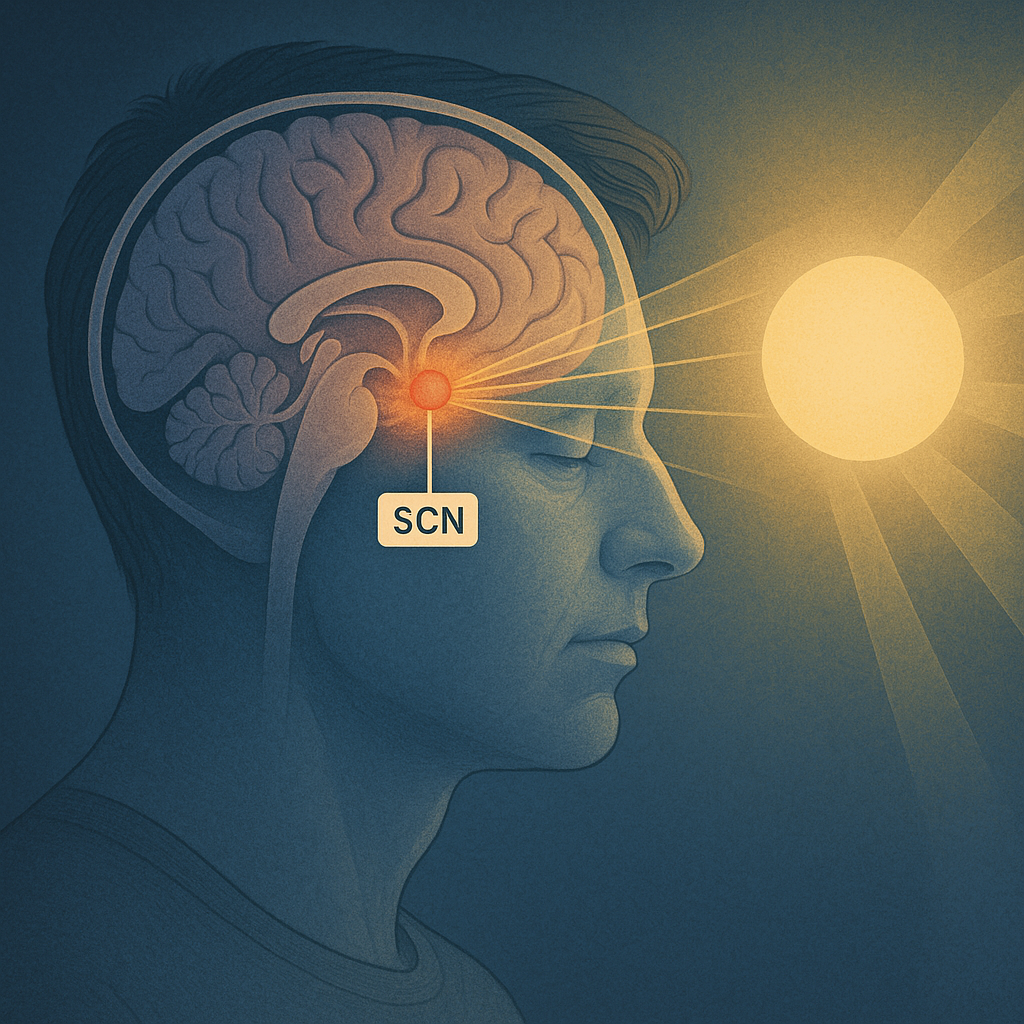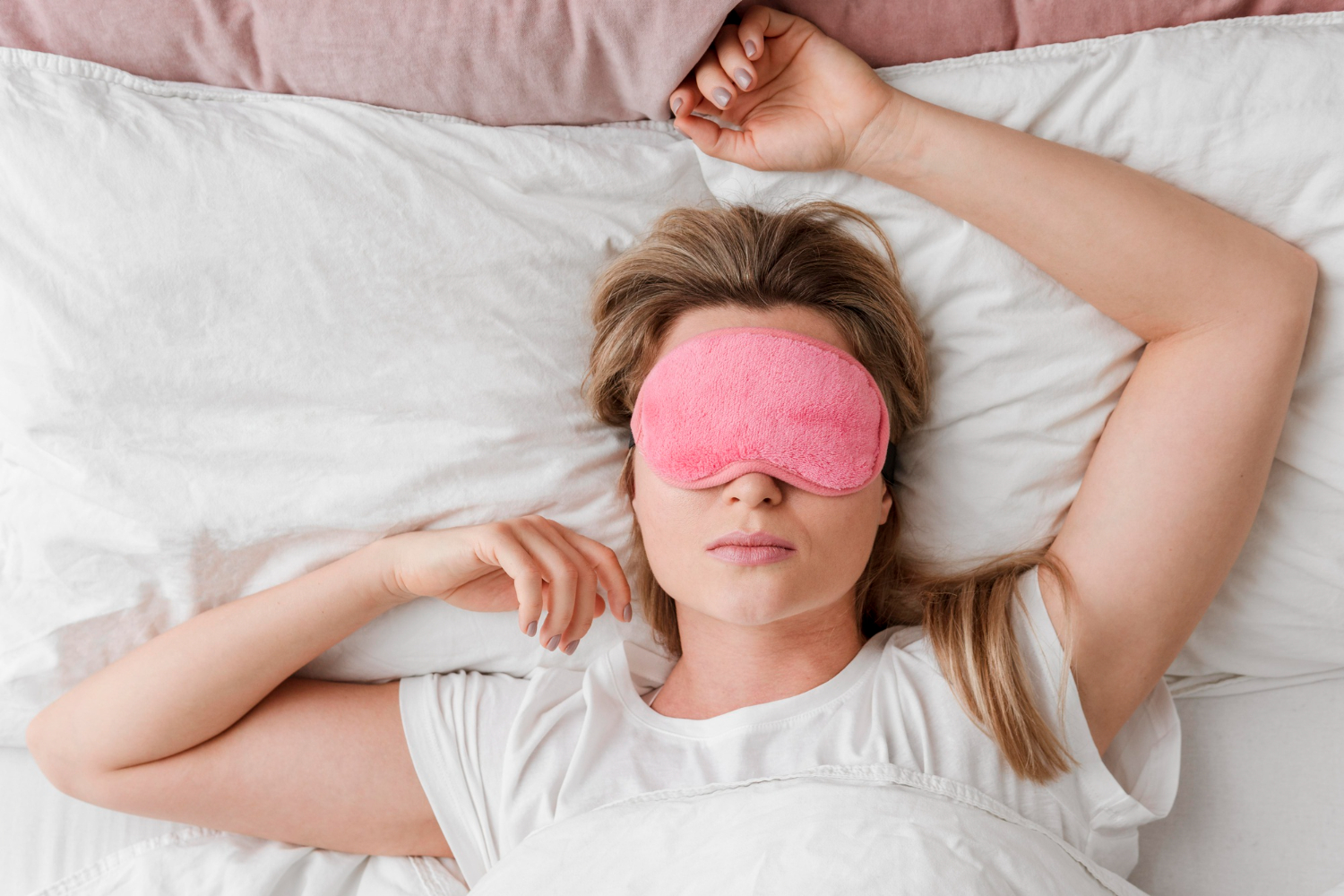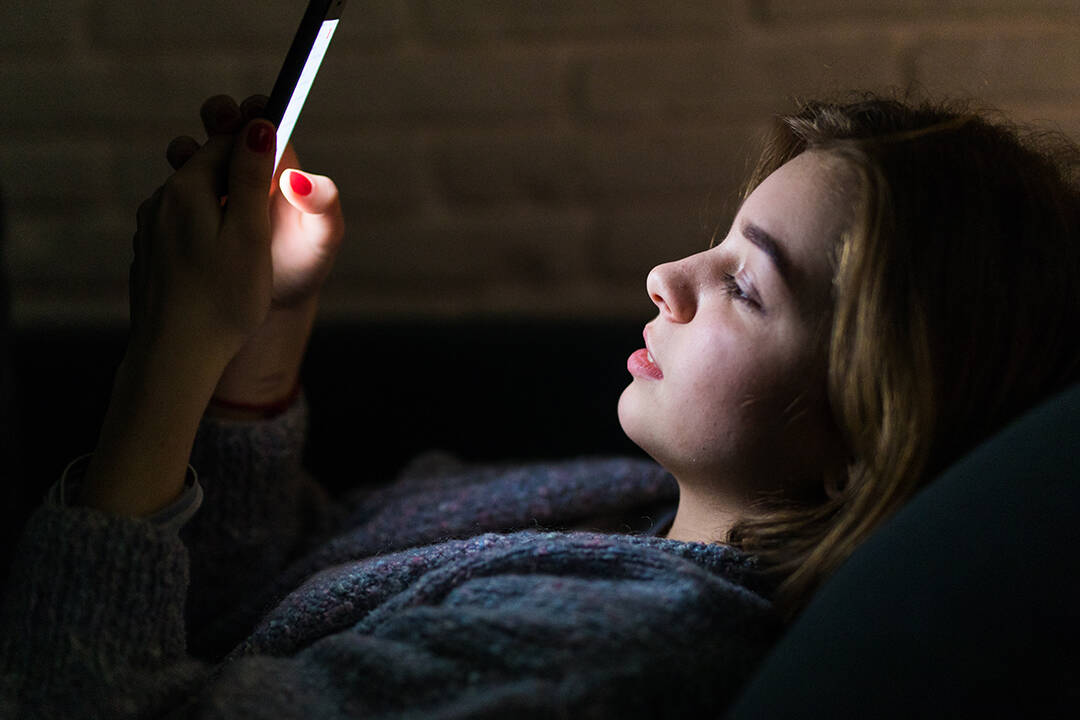Let’s be honest—how do most of you fall asleep these days?
Many of you might be scrolling through social media, watching a show, or browsing on your phones until your eyes finally shut. And then there’s that frustrating cycle: I can’t sleep, so I check my phone. But checking my phone keeps me awake, so I keep scrolling!

This is where an essential part of our sleep cycle comes into play—darkness. As children, we feared the dark. Horror movies portray it as something to be avoided.
But what if I told you that darkness is not your enemy? In fact, sleeping in the dark is one of the most powerful tools for your health.
Yet, in today’s world, we are constantly surrounded by artificial light—from phones, TVs, and streetlights to bedside lamps and nightlights. The problem? Our bodies were never designed for this level of nighttime exposure to light. The more light we absorb after sunset, the more we disrupt our natural sleep-wake cycle, leading to poor sleep and long-term health conditions.
But you can take control of your sleep environment, right? Over the years, I’ve shared countless sleep hacks, but one that remains non-negotiable is this—sleeping in total darkness. This simple yet powerful technique was at the heart of my movement, #SleepDeeperIndia, which started with one tip and spread through families, workplaces, and communities.
Let’s explore why sleeping in the dark is so crucial and how to increase deep sleep.
First, let’s understand the science of sleep & the role of light in your body clock.
Ever wonder why you feel awake during the day and sleepy at night? That’s your circadian rhythm at work—your body’s natural 24-hour clock that tells you when to wake up, eat, and sleep. And guess what? It runs on one main signal—light.
- The moment sunlight hits your eyes in the morning, your brain gets the message: Wake up! This light shuts down melatonin (the hormone responsible for sleep) and boosts energy, mood, and focus. That’s why stepping outside first thing in the morning—even for just 10 minutes—can make a huge difference in how you feel throughout the day.
- At night, the opposite happens. When it gets dark, your brain releases melatonin, helping you relax and fall asleep. But here’s the problem—artificial lights from phones, TVs, and bright bulbs trick your brain into thinking it’s still daytime, delaying melatonin production and keeping you wired. This is why sleeping in the dark is essential for getting quality rest and ensuring your body functions optimally.
If you’re eager to explore how the circadian rhythm works and its health benefits, enroll in our online educational course to learn more about optimizing your sleep.
Coming to your body’s master clock: The SCN
Inside your brain, there’s a tiny but powerful structure called the suprachiasmatic nucleus (SCN)—your body’s master clock. It controls your circadian rhythm and responds directly to light.

- Morning light tells it to wake you up, and evening darkness signals it to help you sleep.
- But if you’re exposed to bright light late at night, your SCN gets confused, pushing your sleep time later and making you feel groggy the next day.
Your body is designed to follow nature’s light and dark cycle. Respect it!
Now, what makes you feel sleepy at night?
It’s melatonin, the primary hormone responsible for sleep. It is your body’s natural sleep hormone. Think of it as your internal bedtime signal, telling your body when it’s time to wind down and rest. Therefore, it’s also called the hormone of darkness.
- As the sun sets and darkness takes over, your brain (specifically, the pineal gland) starts producing the hormone responsible for sleep.
- This hormone helps lower your body temperature, slow down brain activity, and prepare you for deep, restorative sleep.
- Melatonin levels peak in the middle of the night and then gradually drop as morning approaches, helping you wake up feeling refreshed.
But here’s the main point—melatonin only works properly in the dark.
- When you expose yourself to bright lights, especially from screens, your brain gets confused and thinks it’s still daytime. This suppresses melatonin production, delaying sleep and reducing sleep quality.
- Even dim light exposure (as low as 8 lux—the brightness of a nightlight) can impair melatonin production.
Over time, this can lead to:
- Trouble falling or staying asleep
- Poor recovery and fatigue
- Increased stress and hormone imbalances
- Higher risk of long-term health issues like metabolic disorders
Shift workers exposed to artificial light at night have an increased risk of metabolic disorders, cardiovascular diseases, and even certain cancers.

Here’s my experience with melatonin:
(This is my experience, not medical or lifestyle advice for you.)
A few years back, I had used 3mg of melatonin and valerian root exactly eight times—to deepen my sleep when I needed it. I don’t struggle with sleep. In fact, I’m blessed to sleep deeply most nights, except when jet-lagged.
My deep study into melatonin has shown me its incredible benefits, many of which science has already documented—yet most people don’t tap into them. It’s not just a sleep hormone; research links it to immune support, hormone balance, and even cancer protection.
We’ve used it to help clients transition off pharmaceutical sleep aids (with their doctor’s guidance), combined with lifestyle, food, pranayama, and yoga.
Is it magic? No. A replacement for your doctor? No. But it has worked for me and many of my clients.
Long story short, melatonin isn’t a cure-all. The first choice is to let your body naturally produce enough of the hormone responsible for sleep. The second is to supplement when needed—with medical supervision. But never misuse or overuse what’s good for you—it can easily turn against you.
Moving on to the importance of sleeping in the dark and how it enhances sleep quality…
When the sun sets, and the surroundings become dark, your body begins a series of processes designed to restore and rejuvenate. Without darkness, these biological mechanisms are disrupted, leading to poor sleep and health issues. Sleeping in the dark is crucial for maintaining optimal sleep quality and overall well-being.
Promotes deeper sleep stages:
Darkness helps transition your brain through the essential cycles:
- Stage 1 & 2: Light sleep, where your body begins to relax.
- Stage 3: Deep sleep, critical for physical restoration.
- REM Sleep: The stage for memory consolidation and emotional processing.
Without proper darkness, your body struggles to enter deep sleep and REM cycles, leading to poor sleep quality. Sleeping is good for health, but only if it’s deep, uninterrupted sleep.
Regulates cortisol and other hormones:
Cortisol, the primary stress hormone, should be naturally low at night. However, exposure to artificial light at night (ALAN) can increase cortisol levels, keeping you alert and restless.
- Research shows that people exposed to light during sleep have higher nighttime cortisol levels, leading to poor stress management and increased risk of anxiety. (Source: Figueiro, M. G., & Rea, M. S. (2010). The effects of red and blue lights on circadian variations in cortisol, alpha amylase, and melatonin. International journal of endocrinology, 2010, 829351. https://doi.org/10.1155/2010/829351)
Testosterone and growth hormones, essential for muscle recovery, fat metabolism, and overall energy levels, are secreted at night in deep sleep, but light exposure can disrupt their release.
Enhances metabolic health and weight regulation:
Sleep deprivation due to light exposure can lead to increased ghrelin (hunger hormone) and decreased leptin (satiety hormone), promoting overeating and weight gain.
- A study found that individuals who sleep in complete darkness have better insulin sensitivity and a lower risk of type 2 diabetes. (Source: Mason, I. C., Qian, J., Adler, G. K., & Scheer, F. A. J. L. (2020). Impact of circadian disruption on glucose metabolism: implications for type 2 diabetes. Diabetologia, 63(3), 462–472. https://doi.org/10.1007/s00125-019-05059-6)
Many people unknowingly sabotage their sleep quality by sleeping with light sources like night lamps, streetlights, or electronic screens.
- Even a small amount of light exposure can reduce melatonin production by 50%. (Source: Gooley, J. J., Chamberlain, K., et al. Exposure to room light before bedtime suppresses melatonin onset and shortens melatonin duration in humans. The Journal of clinical endocrinology and metabolism, 96(3), E463–E472. https://doi.org/10.1210/jc.2010-2098)
And, I’ve emphasized time and again that disrupted sleep is linked to heart disease, diabetes, obesity, and cognitive decline. Poor sleep quality can worsen symptoms of anxiety, depression, and mood disorders.
So, with that being said, it’s not that light is bad!
It’s artificial light at the wrong times that messes with our sleep. Natural light, especially in the morning, is one of the best ways to improve sleep quality at night.
Morning sunlight triggers a chain reaction in your body:
- More sunlight in the morning = More serotonin during the day = More melatonin at night = Deeper, restorative sleep
✔ Morning sunlight: Step outside within 30-60 minutes of waking (10-15 minutes is enough)
✔ No sunglasses: Let the light hit your eyes directly (but don’t stare at the sun!)
✔ Move while you’re at it: A morning walk or stretching outside enhances the benefits
✔ Avoid artificial light first thing in the morning: Open your curtains instead of scrolling on your
Better sleep starts in the morning. But what about your actual sleep space?
Let’s talk about practical ways to optimize your sleep space for total darkness.
If your bedroom isn’t set up for deep, uninterrupted sleep, all the right habits won’t work as well. If you’re wondering how to increase deep sleep, your sleep environment matters. A lot. Here are some practical ways to ensure you’re sleeping in the dark and increase deep sleep.
1. Blackout curtains
Streetlights, headlights, early morning sun—all of these can mess with your sleep cycle. If you want uninterrupted, deep sleep, blackout curtains are a game-changer.
- Blocks 99% of outside light
- Helps regulate room temperature (cooler = better sleep)
- Improves melatonin production for deeper sleep cycles
Fix it: Invest in high-quality blackout curtains or use layered drapes to block every bit of light.
2. Remove electronics from the bedroom
Your phone, TV, laptop—they all emit blue light, which tricks your brain into thinking it’s daytime. This suppresses melatonin and makes it harder to fall (and stay) asleep.
- No screens 30 to 60 minutes before bed
- If you must, use blue light-blocking glasses
- Keep your phone outside the bedroom or on airplane mode
Fix it: Try reading a book, journaling, or practicing deep breathing instead of scrolling at night.
3. Cover or remove LED lights
Ever noticed how your phone charger, alarm clock, or WiFi router has tiny red, green, or blue LED lights? Even though they seem small, they can still disrupt your sleep.
- Blue and white lights are the worst—they reduce melatonin
- If a night light is needed, use a red one (red light doesn’t impact melatonin)
Fix it: Use black electrical tape to cover LEDs, or replace your alarm clock with a non-digital one.

4. Use a sleep mask
If blackout curtains aren’t enough (or if you travel often), a 100% light-blocking mask is an easy fix.
- Blocks all light from screens, windows, and LEDs
- Helps your body stay in deep sleep mode longer
- Supports melatonin production for better sleep quality
Fix it: Choose a comfortable, soft mask that fits well and doesn’t press too hard on your face.
5. Maintain a consistent sleep schedule
Your circadian rhythm loves consistency. If you sleep and wake at different times every day, your body gets confused, and your sleep quality suffers.
- Go to bed and wake up at the same time daily (even on weekends)
- Dim lights 1-2 hours before bed to signal to your body that it’s time to wind down
- Get morning sunlight to reinforce your sleep-wake cycle
Fix it: Set a wind-down routine—no bright lights, calming activities, and a set bedtime.
Remember: The darker your room, the deeper your sleep.
If you struggle with sleep, start by making your room as dark as possible. Your body will thank you with deeper rest, better mood, and improved health.
So tonight, switch off, unplug, and embrace the darkness!
Disclaimer: The information provided in this blog is for educational purposes only and is not intended to be a substitute for professional medical advice, diagnosis, or treatment. Always seek the advice of your physician or a qualified healthcare provider regarding any questions you may have about a medical condition or before starting any new treatment, including supplements or sleep aids.
Struggling to get quality sleep or feel truly refreshed each morning?
Set up a one-on-one consultation with our integrative team to guide you with personalized solutions.
Reach out to us at 1800 102 0253 or write to us at [email protected].






